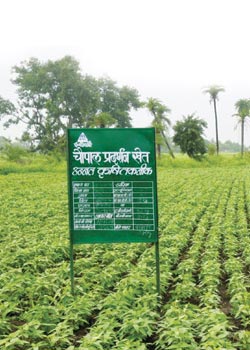Key Impacts, Risks and Opportunities: Sustainability Challenges
Policies Impacting Agri Business
 |
In the modern context, the private sector has a vital and complementary role to play in ensuring an increase in agricultural productivity. Investments by large agri businesses can ensure coordination of the availability of inputs, facilitation of finance for crops and capital investments, and augmentation of resources. This will also enable the delivery of customised extension services to improve productivity through technology, regenerate and enrich land fertility, enable better usage of scarce water resources and adopt best practices in crop management. |
 |
 |
Apart from the lack of fiscal incentives, sizeable investments are today unviable for large agri businesses due to constraints like non-implementation of the ‘Model APMC’ act recommended by the Centre. There is also a lack of cohesiveness of licenses required for agri input sales. For instance, each input like seeds, nutrients, and crop protection chemicals, is governed by a separate act, making it especially cumbersome for companies working across geographies. |
|
 |
In addition, the ‘Essential Commodities Act’ imposes an undue burden as it restricts storage, transportation and exports, further affecting the viability. |
|
 |
Similar limitations are also imposed by the ‘Forward Contracts (Regulation) Act. While it is acknowledged that strong regulation is necessary to curb excessive speculation, the Act doesn’t allow sufficient flexibility for genuine hedgers and takes away critical risk management tools from them, such as options. |
|
 |
ITC operates across the agri value chain in 13 crops with presence in 17 states with resource intensive models that entail heavy capital infrastructure. These initiatives that have empowered over 4 million farmers have been severely crippled by such restrictive regulations that do not distinguish between genuine agri businesses and unscrupulous hoarders. |
|
 |
Policy reforms in the agriculture sector need to cognise for several conflicting needs impacting the value chain from the farmer to consumer. | |
 |
The conflicting needs arise from the following:
|
|
 |
Effectively managing and balancing these conflict is possible though a set of integrated solutions that would include the following:
|
|
ITC's Initiatives
 |
ITC will continue to engage with policy makers through industry associations, organisations and other appropriate for a for enabling a balanced and pragmatic policy framework that not only removes restrictive conditions on the efficient functioning of agri businesses but also facilitates the establishment of market based institutions that can raise agricultural productivity and optimise transaction costs across the value chain. |
|
 |
ITC’s e-Choupal network, which leverages information technology to empower farmers is a rich repertoire of agri based interventions, not only address the core needs of farmers in terms of infrastructure, connectivity, price discovery and market access, but also provide a significant boost to farm productivity through extension services and research based agri-inputs. Initiatives like the ‘Choupal Pradarshan Khet’ bring suitable agricultural best practices to farmers and have demonstrated significant productivity gains. These interventions have helped transform village communities into vibrant economic organisations, by enhancing incomes and co-creating markets. ITC’s e-Choupals serve 40,000 villages and 4 million farmers, making it the world’s largest rural digital infrastructure.
|
ITC’s e-Choupal network , which leverages information technology to empower farmers is a rich repertoire of agri-based interventions not only address the core needs of farmers in terms of infrastructure, connectivity, price discovery and market access, but also provide a significant boost to farm productivity through extension services and research based agri-inputs
|
